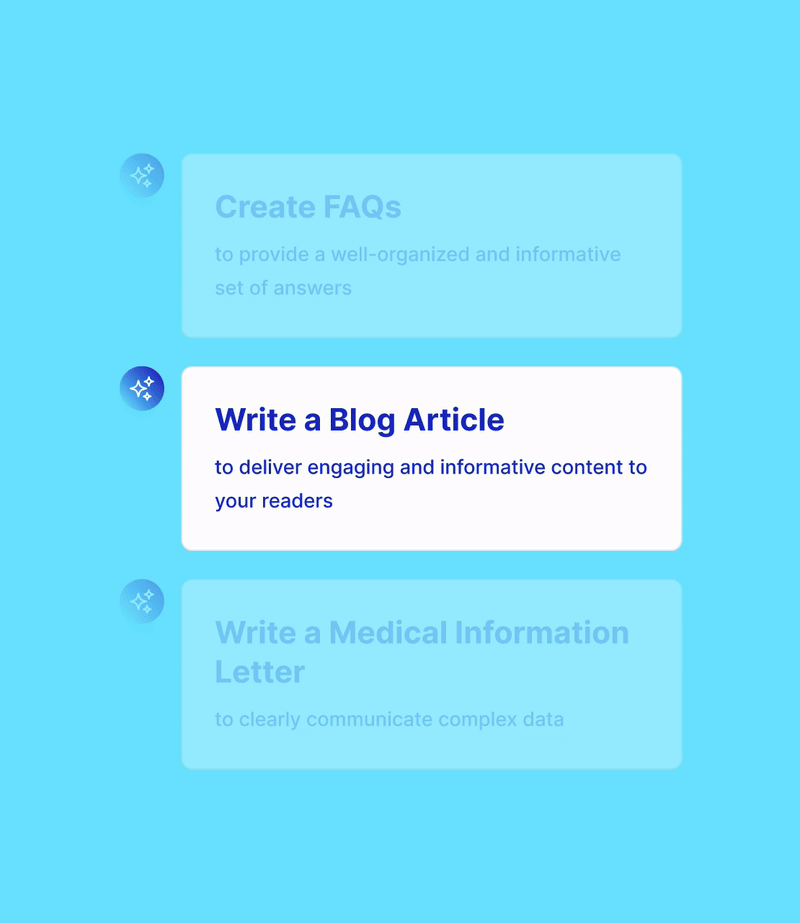Will AI Take My Job? Preparing for Change in Life Sciences Careers
The integration of AI into the life sciences industry is rapidly transforming roles and responsibilities. While AI automates tasks like data analysis and regulatory compliance, it also creates new opportunities. Data analysts, regulatory specialists, medical writers, laboratory technicians, and customer support professionals are seeing shifts in their roles. The focus is moving towards interpreting AI insights, providing human oversight, and ensuring ethical standards. Professionals are encouraged to upskill, prioritize human-centric skills, and embrace AI as a partner. This evolution is not about job loss but about reimagining careers, with new roles emerging in an AI-driven future.

The integration of artificial intelligence (AI) into the life sciences industry is accelerating at an unprecedented pace. For many professionals, this rapid evolution raises questions about the future of their roles and responsibilities. Will AI replace jobs? Will it enhance them? The answers aren’t black and white, but one thing is clear: change is coming.
While AI brings the potential to streamline workflows and automate repetitive tasks, it also opens the door to new opportunities. The key lies in understanding which roles will most likely be impacted and how professionals can position themselves to thrive in an AI-augmented workplace.
Understanding AI’s Impact on Roles
1. Data Analysts
AI excels at processing and analyzing massive datasets. Tasks like cleaning data, running statistical models, and identifying patterns can now be automated, often with greater speed and accuracy.
However, automation doesn’t eliminate the need for human analysts. Instead, it shifts their focus toward interpreting AI-generated insights, drawing actionable conclusions, and providing strategic recommendations. The role evolves into one that requires a blend of technical expertise and critical thinking.
2. Regulatory Specialists
Regulatory compliance often involves repetitive documentation and review processes. AI tools can now automate formatting, flag inconsistencies, and even cross-check documents against regulatory guidelines.
Despite this, the need for regulatory specialists remains strong. These professionals provide the human oversight necessary for interpreting complex regulations, addressing ethical concerns, and navigating gray areas that AI cannot handle.
3. Medical Writers
AI-powered writing tools are transforming medical communication. From drafting clinical trial summaries to generating literature reviews, AI can quickly produce content that previously required hours of manual effort.
Yet, the human touch is indispensable. Medical writers are increasingly focusing on refining AI-generated content, ensuring it resonates with diverse audiences, and crafting scientific narratives that align with regulatory and ethical standards.
4. Laboratory Technicians
In laboratories, AI-driven automation is taking over repetitive tasks like pipetting, cell sorting, and data logging. Robotic systems and smart machines are now standard tools in modern labs.
This shift doesn’t eliminate the role of technicians but redefines it. The emphasis moves to overseeing automated systems, troubleshooting issues, and ensuring experimental integrity.
5. Customer Support Professionals
AI chatbots and virtual assistants are revolutionizing customer support in life sciences. Routine queries are resolved faster and more efficiently than ever.
Human customer support roles, however, are far from obsolete. Professionals now focus on complex or emotionally sensitive interactions where empathy and nuanced problem-solving are required.
Adapting to the AI Revolution
The transformation driven by AI isn’t about replacing humans—it’s about evolving roles to focus on higher-value work. For life sciences professionals, the path forward lies in adaptability.
Upskill and Reskill Continuously
Staying competitive means embracing continuous learning. AI, data science, and machine learning are becoming integral to the life sciences skill set. Online courses, workshops, and certifications offer accessible ways to build these competencies.
Prioritize Human-Centric Skills
AI can analyze data, but it can’t replicate critical thinking, creativity, or ethical judgment. These uniquely human skills remain essential in roles that demand innovative problem-solving and interpersonal connections.
Leverage AI as a Partner
Rather than seeing AI as a threat, professionals can view it as a tool that enhances their capabilities. Tools like MACg streamline workflows, allowing individuals to focus on strategic and impactful tasks.
Embrace Emerging Roles
As some roles shift, others emerge. From AI trainers to data integrity specialists, the life sciences industry is seeing the rise of entirely new positions tailored to an AI-driven future.
Embracing Change with Confidence
AI is reshaping the life sciences landscape, impacting roles and creating opportunities in equal measure. By embracing change, investing in new skills, and leveraging tools like MACg, professionals can turn disruption into opportunity.
The future of life sciences isn’t about jobs lost—it’s about careers reimagined. Those ready to adapt will find themselves at the forefront of a transformative era, where technology and human expertise come together to drive progress.
Start creating & editing content in minutes with AINGENS' MACg.
Discover all the amazing things you'll create with AI.
